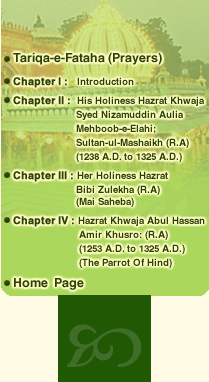|
His Holiness was the fourth Spiritual Successor
(Khalifa) of Hazrat Khwaja Muinuddin Hasan Chishti of Ajmer,
the founder of the Chishti Order in India. His Holiness had
unique merits as a learned scholar, an able and diligent administrator
and a perfect Spiritual Master. Picking up the sacred work
of Hazrat Baba Farid, His Holiness founded Khanqahs (monastries)
on the line of Ghaus-ul-Azam Hazrat Sheikh Abdul Qadir Jilani
of Baghdad all over India and sent his trained Khalifas to
impart teachings in Truth, love and goodwill amongst people
of India. When His Holiness found that language and dialectic
obstacles hindered the harmony of the people he ordered his
disciple Hazrat Amir Khusro to invent a new language and that
came to be known as Urdu. His Holiness gave a revolutionary
dimension to religious activity by identifying it with the
service of man. His Holiness taught his disciples that looking
after the poor, needy and downtrodden was greater than the
formal performance of religious practices.1
A contemporary Saint once said that while Allah Talaha (God)
has given only one power to mystics in general. He had bestowed
two upon His Holiness that is; to pray to God and to bear
the burden of looking after the problems of people.2
Both God and man formed the basis of His Holiness dynamic
social value system. Thus, His Holiness represents the secular
character of Indian culture. Under His Holiness leadership,
the sun of the Chishtia Order shone itself at its heights
in the history of Indian Sufism.
His Holiness was from a distinguished parentage
who had their lineal source from the illustrious family of
the Holy Prophet himself.
 -Zohar, Leviticus 10b
-Zohar, Leviticus 10b
- Life
History
- Spiritual
Lustre of His Holiness
- Spiritual
Principles and Khilafat Namah from Hazrat Baba Fariduddin Ganj Shakar (R.A)
- Glories
of His Holiness
- The
Curtain Falls
- Homage
and Worship
- Disciples
and Descendants of His Holiness Hazrat Sultan-ul- Mashaikh (R.A)
- WORKS
- Divine
Graces of His Holiness Sultan-ul-Mashaikh (R.A.)
-
10 (a) MUNAJATH (Dua) in the Darbar of His Holiness Mehboob-e-Elahi; Sultan-ul-Mashaikh
(R.A)
10 (b) Munajat (Sunset Prayers)
- Ten
Tasbihs of His Holiness for Peace & Successful Life
|
|
1
Fawa’id u’l-fu’ad p=13 to 14, 176;
Siyar-u’L-Auliya p=128
2
Tuhfat-u’l-Majalis, Malfuz of Shaikh Ahmad Maghribi, 977 ff
24,ab
|





